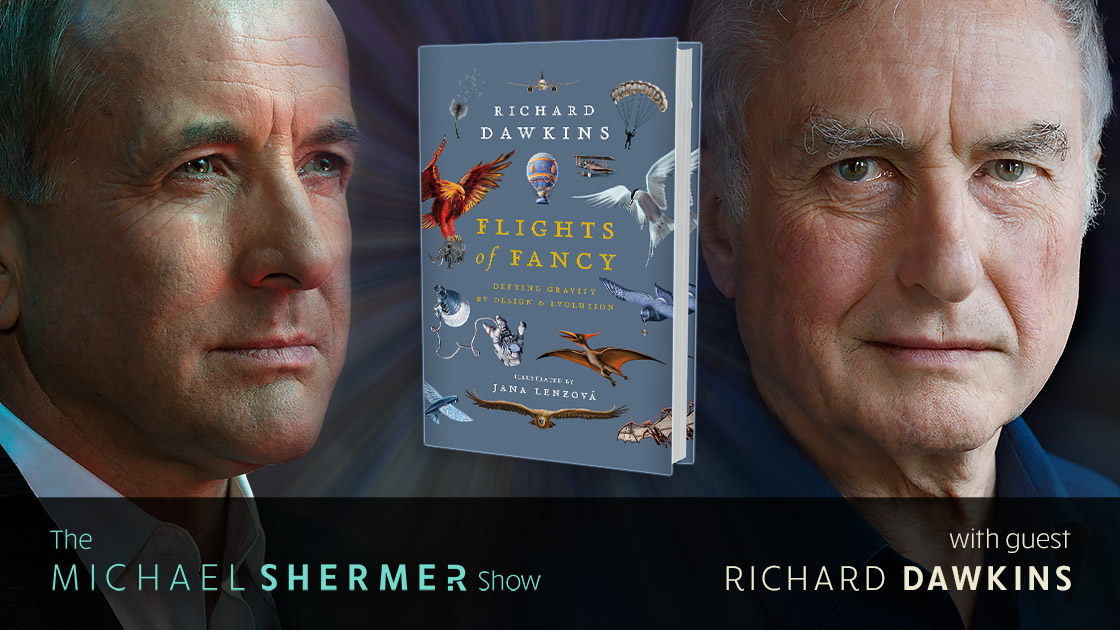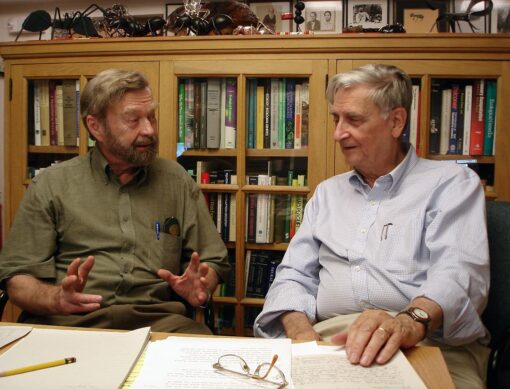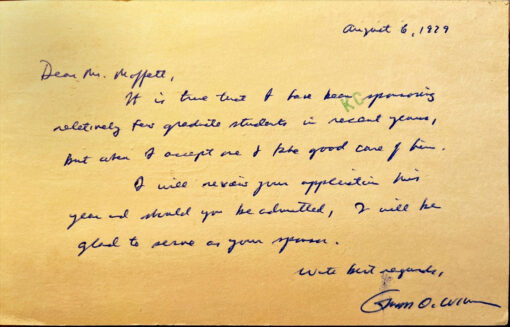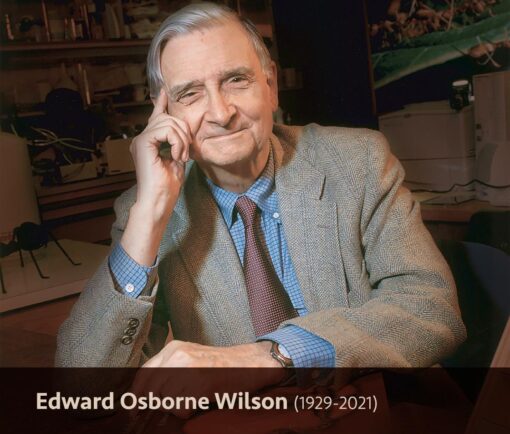E. O. Wilson

Michael Shermer speaks with Richard Dawkins about his new book Flights of Fancy: Defying Gravity by Design and Evolution. They also discuss: nationalism; Russian revanchism; the recent rise of authoritarianism and autocracies; U.S. acceptance of the theory of evolution surpassing 50%; E. O. Wilson; and more…
Was the great scientist E. O. Wilson a racist? No! Because Wilson corresponded with the notorious race differences psychologist Phillippe Rushton, critics claim it proves Wilson was a racist. Here’s why the critics are wrong, dangerously wrong.
In this letter to Bert Hölldobler, following up on his defense of his long-time colleague E. O. Wilson, who has been falsely accused of racism and knowingly promoting race science, Mel Konner, who also knew and worked with Wilson, reinforces the point that Wilson’s defense of Philippe Rushton was done out of concerns about academic freedom; in fact, Konner notes that there are other reasons for critiquing Wilson, primarily for his ultimate rejection of kin selection — one of the…
Mel Konner, in response to Bert Hölldobler’s defense of E. O. Wilson, reinforces the point that Wilson’s defense of Philippe Rushton was done out of concerns about academic freedom; PLUS: Michael Shermer speaks with Oliver Stone about Ukraine, Putin, and the military-industrial complex.
Mark W. Moffett remind us that breakthroughs in science often come about by exploring points of similarity between things that are normally seen as very different. PLUS: Michael Shermer speaks with quantum physicist, Jim Al-Khalili, who reveals how 8 lessons from the heart of science can help us all get the most out of our lives. PLUS: In SRC Report PCIS-005, we take a look at Conspiracy Theory Endorsement by Generation.

Mark W. Moffett describes how comparing identical things is extremely boring; breakthroughs in science often come about by exploring points of similarity between things that are normally seen as very different—in his own research, and that of his mentor, Edward O. Wilson, ants and humans.
Is there vigilantism in science? Was the renowned Harvard biologist Edward O. Wilson wrongly convicted of racism and promoting race science in the court of public opinion? Yes, says his long-time collaborator and world-class scientist Bert Hölldobler. PLUS: Michael Shermer speaks with Batya Ungar-Sargon about her new book Bad News: How Woke Media Is Undermining Democracy in which she reveals how American journalism underwent a status revolution over the twentieth century — from a blue-collar trade to an elite profession.

Is there vigilantism in science? Was the renowned Harvard biologist E. O. Wilson wrongly convicted of racism and promoting race science in the court of public opinion? Yes, says his long-time collaborator and world-class scientist Bert Hölldobler.
Michael Shermer speaks with American psychologist Dr. Frank J. Sulloway about the relative roles of genes, environment, hard work, and luck in how lives turn out. For decades, Dr. Sulloway has employed evolutionary theory to understand how family dynamics affect personality development.

Michael Shermer speaks with American psychologist Dr. Frank J. Sulloway about the relative roles of genes, environment, hard work, and luck in how lives turn out. For decades, Dr. Sulloway has employed evolutionary theory to understand how family dynamics affect personality development.
To honor the legendary evolutionary theorist and biologist Edward O. Wilson (1929–2021), who passed away on December 26, 2021 at the age of 92, we present two tributes to him from Mark Moffett and Frank Sulloway, scientists who knew the man well and are deeply familiar with his work and his legacy.
In this tribute to Edward O. Wilson, Frank J. Sulloway recounts how the Harvard evolutionary biologist had a profound and enduring influence on his own life and academic career. Wilson, says Sulloway, was the model of a mentor who cared deeply about his students and collaborators. By sharing his infectious love of the wonders of evolutionary biology, Wilson inspired countless others with his impassioned vision about the need to safeguard biological diversity.

To honor the legendary evolutionary theorist and biologist Edward O. Wilson, who passed away on December 26 at the age of 92, his former student Mark Moffett, pays tribute to his mentor in this deeply moving memoir of his time working with the great scientist.
Michael Shermer speaks with Brian Klass about power and corruption, based on his book Corruptible: Who Gets Power and How it Changes Us. PLUS: In Memoriam: Edward O. Wilson (1929–2021) — entomologist, evolutionary theorist, and unifier of all knowledge. Read the interview from Skeptic 6.1 (1998).

In Memoriam: Edward O. Wilson (1929–2021) — entomologist, evolutionary theorist, and unifier of all knowledge. Read an extensive and intimate interview we published in Skeptic in 1998, Vol. 6, No. 1, conducted by our editor Frank Miele, upon the occasion at the time of the publication of Wilson’s game-changing book Consilience.
What is the origin of religion? Is it purely a cultural product or does it have deeper roots in our evolutionary past? Evolutionary biologist David Sloan Wilson argues in his book Darwin’s Cathedral that religion served as a social tool to unite groups into cohesive wholes by which they could out compete groups without religion, and thus the religious impulse was born. Biologist Peter Corning considers the pluses and minuses of this theory of religion in this review.














